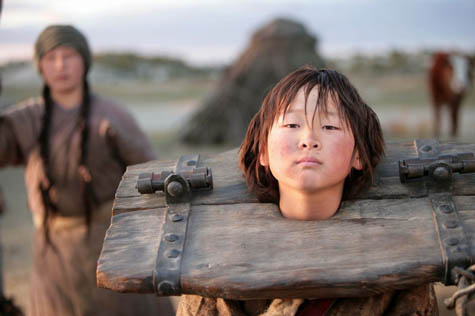Woodard’s Wraps: Film Festival, Day Two
A round-up yesterday's happenings from the Santa Barbara International Film Festival

A MOMENTARY R.I.P.: Aesthetics, star-gazing, rain-dodging and line issues aside, one of the most salient impressions on the official Day One of Santa Barbara International Film Festival is that this is the first time in its 23-year history sans the Italian & Greek Deli. Since closing last year, the historic slice of Santa Barbara seems a gaping absence at the corner of State and Ortega, especially now with the festival hunkering down on the same block. To outsiders and newcomers, that may seem a trivial kvetch, but the absence feels like a missing piece in the festival experience as we’ve come to know it. No longer can hungry, huddled masses dash up the block between screenings for gastronomic succor, happily knowing that the food is real, fresh, and non-corporate, in a downhome and locally owned and operated spot. Walking by that corner, a genuflection, a belly grumble and a tear are in order.
On the brighter side, Friday night’s main attraction at the Arlington Theatre had largely to do with the hosting venue. It was a pleasantly disorienting feeling to actually see an art film on this more blockbuster-minded big screen, where only 24 hours earlier, we were suffering through the middling, maudlin opening night Hollywood ditty, Definitely, Maybe. (Alas, rule number one at SBIFF: never judge it by the opening night fare.) Directed by Sergei Bodrov, Mongol is a sweeping Kazakhstani-made epic about Genghis Khan and Kazakhstan’s Oscar bid, not to mention a salvo of revenge against Kazakh-basher Sasha Baron “Borat” Cohen. In the Arlington’s epic-loving screen and room, the film beautifully spilled its vast vistas of the Central Asian steppes and its heroic story-not to mention the slow-mo blood-letting of its battle scenes. The Arlington and serious cinema have got to go on meeting like this.
Also on Friday, far quieter, subtler cinema from distant shores came in the form of two recommended films from the expanded “Eastern Bloc” segment of this year’s fest, personally programmed by kindly film geeky honcho Roger Durling. From Poland comes the disarming bittersweet existential tonic of Time to Die, director Dorota Kedzierawska’s slow and tightly-focused portrayal of an old woman nearing the end of her life and hunkering down in her funky old house with her doting dog. What may sound gloomy is anything but, a life-affirming saga in the end-of-the-line sector of human experience, where cinema too rarely goes. (Partly what makes Julie Christie’s shining vehicle Away from Her so special). It’s hypnotic in its black-and-white visual strategy, and the superb acting-of both the funny feisty protagonist, and her highly expressive canine-are surely worthy “of best of the fest” awards.
From Croatia comes Armin, another fascinating and odd-by western standards-jewel, well worth checking out. (This is also an Oscar submission film, although it’s far too interesting to win in a category requiring fuzzy sentimentalism.) Here is one of those precious film experiences, seemingly slow and with a paper thin plot, about the journey of a Croatian father and his son to a hotel in Zagreb, to audition for a German film about the Bosnian war. But director Ognen Svilicic’s film boasts a remarkable system of undercurrents and hidden themes beneath the droll, stately compositions and unusual editing cadences. Armin is one of those beautiful, deceptively understated films you watch-even after a long day of five screenings-and fall into another dimension, a dimension of sight and sound and festival-worthiness.



